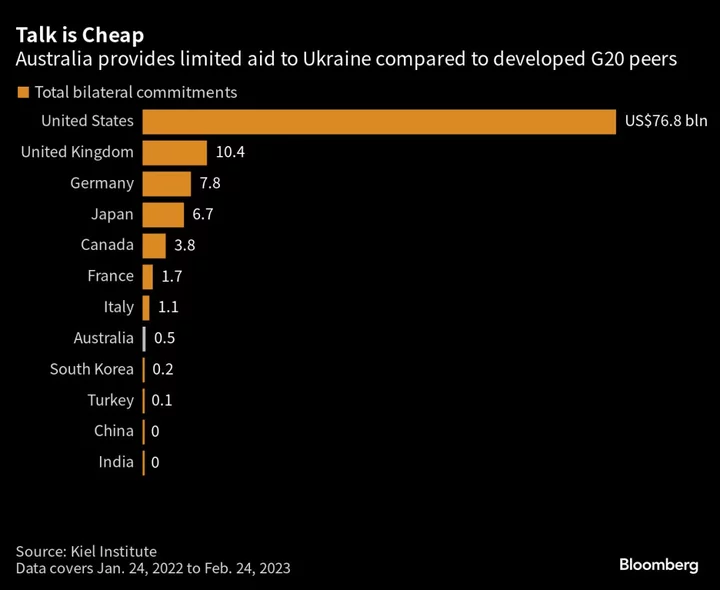“Aussies know a road warrior when they see one,” Ukraine’s Defense Department said earlier this month in a video posted to social media urging Australia to send over more tanks.
Featuring rock music blaring over footage from Mad Max movies portraying battles in a dystopian Australia, the video highlighted a new push to urge Prime Minister Anthony Albanese’s government to ramp up support as Kyiv confronts Russia’s vast military.
Unspoken is an important statistic: Among developed Group of 20 nations, Australia is among the smallest contributors to Ukraine despite being a major indirect economic beneficiary of the war.
In the 15 months since Moscow launched its invasion, the spike in energy and other commodity prices has given Australia around a A$150 billion ($102 billion) export bonanza, according to calculations made by Bloomberg Economics’ James McIntyre, a former government economist.
Yet the country has provided the equivalent of 0.5% of that windfall in military and humanitarian aid to Ukraine, less than what the likes of Poland, the Czech Republic and Denmark have given. That has prompted Australia’s conservative opposition and academics to demand the government give more support.
In the video, Ukraine’s Defense Department asked Australia to provide some of the 59 M1A1 Abrams tanks it received from the US more than 15 years ago, now that Canberra is set to acquire newer versions. The request came ahead of a NATO summit in Lithuania in July that Albanese plans to attend.
“There is a risk of Australia being seen as strategic bystanders — that we talk a good talk but we’re not actually doing much in practical terms,” said Malcolm Davis, a senior analyst at the Australian Strategic Policy Institute in Canberra. “It really is up to the Australian government to step up.”
Defense Minister Richard Marles earlier this month rejected the assertion that Australia hasn’t done enough, telling Bloomberg Television that the nation is the largest contributor in the Indo-Pacific outside the US.
“It’s understood across Europe and understood by Ukraine itself that Australia is punching above its weight in its support of Ukraine,” Marles, who is also deputy prime minister, said on June 3.
Ukraine is looking to acquire more lethal aid and supplemental firepower from major military powers with the likes Australia, Canada, Norway and Sweden.
While military aid from Australia in itself may do little to alter the battlefield, it helps keep a flow of weaponry moving to Kyiv and may encourage others like South Korea, which is weighing whether to start providing weaponry to President Volodymyr Zelenskiy’s government.
While Australia is at the other end of the world, it’s been impacted by Moscow’s military campaign against its neighbor from the outset, with 38 of its citizens killed in 2014 when Russian separatists in eastern Ukraine shot down Malaysia Airlines Flight 17.
Australia started helping Ukraine soon after the February 2022 invasion, providing 90 protected mobility vehicles, artillery, de-mining equipment, unmanned aerial vehicles and anti-armor weapons, among others.
“The reason we are doing that, notwithstanding Ukraine is a long way from Australia, is that what we see at issue there is the very sanctity of the global rules-based order,” Marles said of Australia’s assistance.
The economic dividend to Australia from the conflict can be seen in fiscal data, said McIntyre from Bloomberg Economics.
In the May 2021 budget, Australian company tax receipts for fiscal 2022 were forecast at A$82.3 billion and were seen easing to A$70.4 billion the following year. Instead, last month’s budget showed those receipts at A$123.3 billion in fiscal 2022 — or A$41 billion higher than projected — and forecast to swell to A$138.4 billion in fiscal 2023, or A$68 billion more than earlier seen, according to McIntyre.
“The spike in export revenues dwarfs even the 2000s mining boom,” said McIntyre, who covers Australia and New Zealand. “There was a fiscal boost as well, with the surge in mining profits delivering a company tax windfall that tipped the government’s budget into a surprise surplus.”
Last month’s budget didn’t offer any additional funding to support Ukraine.
“Australia’s commitments have failed to keep pace with our partners,” the opposition Liberal National Coalition said in a letter to Marles and Foreign Minister Penny Wong, urging them to step up support. “Other non-NATO contributors now increasingly overshadow Australia’s support.”
Local media reports have said that Australia will provide more assistance, including armored vehicles, retired fighter jets, tanks and other equipment. But there’s been no official announcement.
Ukraine’s appeal with the Mad Max video “was very clever, brilliant,” said ASPI’s Davis. “They’ve taken a piece of Australian folklore and used it to drive home a point that they’re at a critical stage of a fight for their survival and they really need help.”
--With assistance from Ben Westcott and Swati Pandey.

